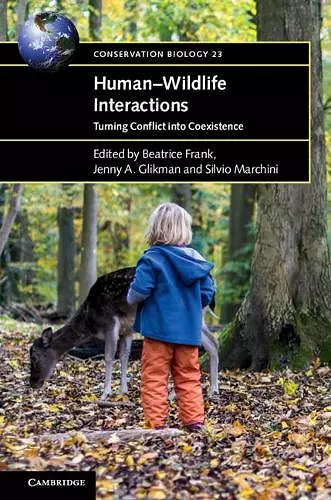Human–Wildlife Interactions
Turning Conflict into Coexistence
Beatrice Frank editor Jenny A Glikman editor Silvio Marchini editor
Format:Paperback
Publisher:Cambridge University Press
Published:2nd May '19
Currently unavailable, and unfortunately no date known when it will be back
This paperback is available in another edition too:
- Hardback£80.99(9781108416061)

Presents solutions to turn conflict into tolerance and coexistence, with an emphasis on the human dimensions of human-wildlife interactions.
Human-wildlife conflict is an urgent challenge for conservation. Framing human-wildlife interactions strictly as conflict, however, limits the array of solutions. With a broader perspective that emphasises tolerance and coexistence, this book presents solutions to turn conflict into coexistence.Human-wildlife conflict (HWC) is one of the most complex and urgent issues facing wildlife management and conservation today. Originally focused on the ecology and economics of wildlife damage, the study and mitigation of HWC has gradually expanded its scope to incorporate the human dimensions of the whole spectrum of human-wildlife relationships, from conflict to coexistence. Having the conflict-to-coexistence continuum as its leitmotiv, this book explores a variety of theories and methods currently used to address human-wildlife interactions, illustrated by case studies from around the world. It presents some key concepts in the field, such as values, emotions, social identity and tolerance, and a variety of insights and solutions to turn conflict into coexistence, from individual level to national scales, including conservation marketing, incremental and radical innovation, strategic planning, and socio-ecological systems. This volume will be of interest to a wide range of readers, including academics, researchers, students, practitioners and policy-makers.
'This is an open-minded book that seeks to examine the many facets of each case study …' Amanda Hardy, The Biologist
'It will be of great interest to life and conservation scientists because it offers a humanistic point of view that is fundamental to conservationists, but which is seldomly effectively addressed. It should also interest academics of the human sciences who are addressing other kinds of conflicts, such as political or religious polarizations … An urgent step in search for the balance necessary for human-wildlife coexistence can be found in this book.' Eduardo Bessa, The Quarterly Review of Biology
ISBN: 9781108402583
Dimensions: 228mm x 152mm x 22mm
Weight: 780g
476 pages